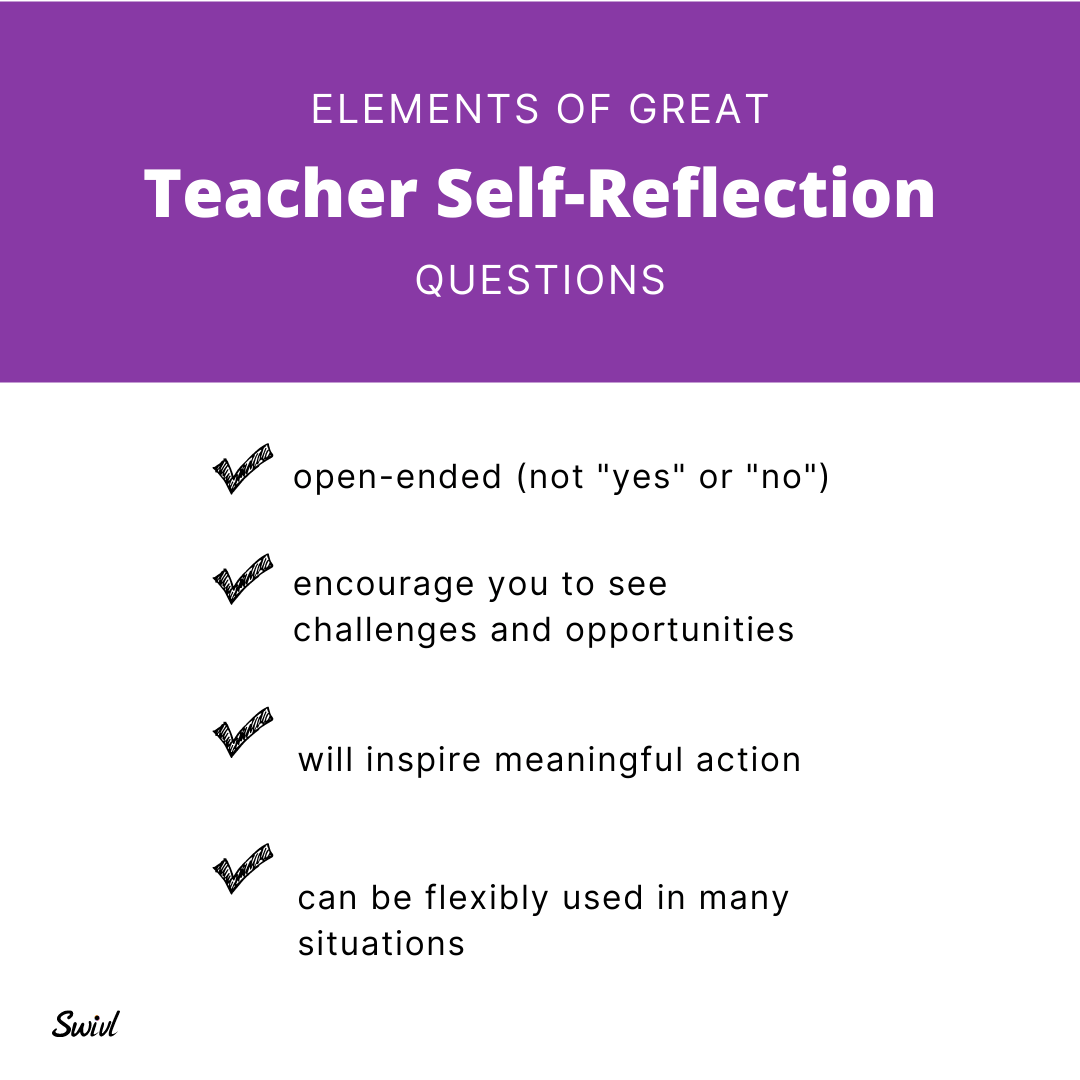
Note: Pair these teacher self-reflection questions with Sessions, our two-step writing process to help educators set and reflect on goals. Try Sessions here (no login required).
A good set of teacher self-reflection questions are one of the simplest, yet most powerful tools for improving practice.
But one of the most common challenges when it comes to teacher self-reflection is getting started or figuring out exactly how to reflect. This big list of teacher self-reflection questions can lead to insights for any educator willing to take time to pause and reflect.
Teacher self-reflection questions for the end of a unit or school year
There’s no better time to reflect upon the school year or the new unit you taught than now—when it’s all over. To uncover the challenges and opportunities that you may have missed while in the moment, use these teacher self-reflection questions to help kickstart your thinking:
- What content, topics, or skills did students improve at most during this time?
- What content topics, or skills did students struggle with during this time?
- When were students most focused, engaged, and energized during this time?
- When were students most unfocused, disengaged, or lethargic during this time?
- When did I as the teacher feel best during this time? Why?
- When did I as a teacher not feel at my best during this time? Why?
- How did seating or other organization of the classroom space have a positive impact on teaching or learning? How can I replicate that?
- How did seating or other organization of the classroom space have a negative impact on teaching or learning? How can I improve that?
- Did certain students or groups of students seem to excel? Why might that be?
- Did certain students or groups of students require more support? Why might that be?
- Which teaching and learning resources were most useful and effective for me?
- What templates, materials or other resources I can save and re-use for next year to save myself time?
- Overall, what went well, and how can I improve the chances of that happening again?
- What didn’t work, and how will I approach it differently next year?
- What were my biggest hurdles, and how did I overcome them?
- What did I learn from my students during this time?
- What’s the biggest lesson I learned this year?
- What changes and new approaches to teaching will I implement in the new year?
Consider starting at the top of the list and writing as much or as little as you’d like about each question. When a specific question grabs your interest, feel free to stick with it and elaborate more. If other questions don’t inspire you to write much, feel free to move on quickly or skip them all together.
For best results, mix teacher self-reflection questions with classroom video
Now that you have a detailed list of teacher self-reflection questions to use, you may be deciding on your method of self-reflection.
Teacher self-reflection is personal, so there is not a one-size-fits-all solution. But here are some recommendations.
First, consider using classroom video to drive your self-reflection.
Video makes it easy to see the challenges and opportunities teachers encounter. On video, a teacher can see that a rowdy class remains standing when the bell rings and struggles to get on track. They can see that a distracted group is led by two students set on socializing. They can see that a student with his head down sits next to a classmate whose back is turned because they have a tense relationship.
Video provides evidence teachers can use to begin addressing challenges, either on their own, by collaborating with colleagues or through the support of a coach or administrator.
When teachers combine well-crafted teacher self-reflection questions with classroom video, the results are accelerated and expanded. Teachers will have realizations like:
- When it’s necessary to slow down and allow students more time to grasp topics
- When it’s beneficial to transition from sage on the stage to guide on the side
- Where you can allocate more time in your lessons to address more difficult topics and answer student questions
- Where holes in content and jumps in logic exist
- Where you spend more of your time physically in the classroom whilst teaching
And more. Having the objective evidence of classroom video, along with thought-provoking teacher self-reflection questions, is a truly powerful combo for educator growth.
Turn reflection into a routine with Sessions
Even the best have room for improvement. The short time you spend engaging in reflection can open your eyes to teaching habits (good or bad) you never realized you had. You’ll see how students react to those habits, how their level of attention is altered, and how the changes you make to your behavior in the classroom changes their behavior. Throughout the process, you’ll also learn new techniques and ways of approaching instruction that are worth sharing with your peers.
To help make reflection part of your routine, consider Sessions. Sessions is a two-step writing process to help educators set and reflect on goals. As part of Teams by Swivl, users also have the option to add video to their reflections. But you can try reflecting with Sessions for free today with no login required.